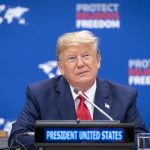The plans laid out by the Trump administration hint at a possible executive order that could bring a temporary halt to the controversial practice of gain-of-function research on viruses, though it comes with a puzzling exception: bird flu might just slip through the cracks. While the intention is to protect public health by limiting research that could lead to more dangerous pathogens, the idea of exempting any virus—especially one associated with the looming specter of pandemic 2.0—raises eyebrows.
This executive order, while not permanent, seeks to rein in the wild world of federal funding for risky virus research. Anyone paying attention knows that gain-of-function is the hot-button issue since many believe it took a starring role in the COVID-19 drama. It seems odd that in a bid to curb the next health disaster, bird flu would suddenly be afforded a special VIP pass. What’s next? A golden parachute for old pet projects?
🚨Trump admin halts funding for gain of function research. Great move, the risk of this research is too great. They want to create a superbug, so we can study the superbug. All good, until it gets out of the lab. This, plus FDA, CDC and NIH halt all public messaging. Today on… pic.twitter.com/i91VFHsPES
— Dr Frank Contacessa (@DrFrank273) January 24, 2025
Critics of gain-of-function research (and there are many more than just “some Republicans”) have voiced concerns that allowing scientists to tinker with pathogens is like giving a toddler a loaded gun. Investigations suggest a more direct link between these experiments and viral outbreaks than many are willing to admit, so leaving bird flu out of this proposed pause screams of double standards. After all, didn’t public health officials claim it was just a matter of time before we faced another pandemic?
Justin Goodman, from the watchdog group White Coat Waste Project, testified to the reckless nature of funding these experiments. It’s a strange twist of fate that while Trump prepares to cut funding, the Biden administration was reportedly more interested in keeping the cash flowing for potentially perilous research on bird flu and monkeypox—two neighbors in the viral family tree that no one wants to invite to the party. The legacy of Anthony Fauci looms large in these conversations, the architect of a funding approach that many would now label both reckless and irresponsible.
As for the information landscape, it remains fraught with bias and suppression. Independent media outfits like PJ Media are navigating a minefield of Google censorship while offering a platform for voices that challenge the status quo. As the digital age has ushered in the era of snowflakes and safe spaces, calling out this type of government-sanctioned research for what it is—dangerous and unnecessary—has never been more crucial. Hence, those seeking clarity and unfiltered information are urged to support platforms committed to transparency and free expression. After all, the stakes are too high to let nuance drown in a sea of misinformation.




